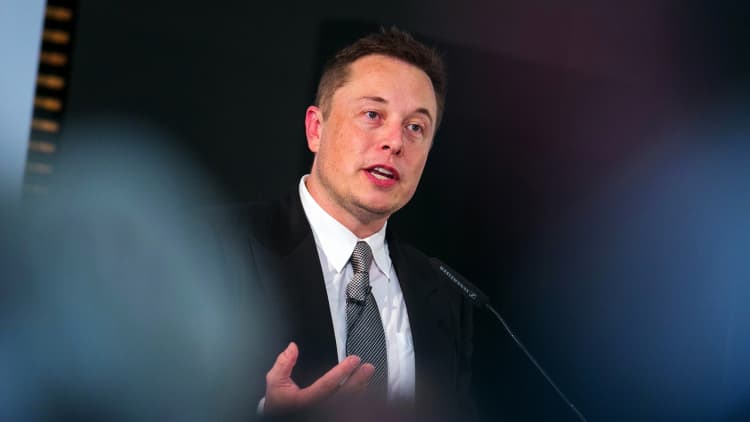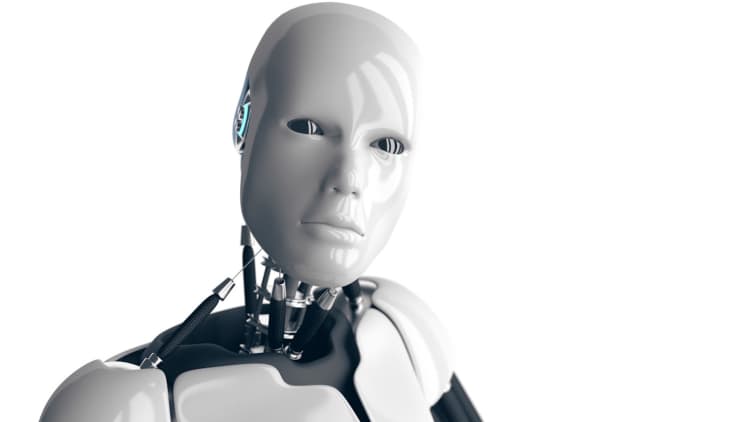Billionaire tech titan Elon Musk says the global race for artificial intelligence will cause World War III and that governments will take the technology "at gunpoint" if necessary. The Tesla and SpaceX chief has said robots will be able to do everything better than humans can. And he has said "AI is a fundamental risk to the existence of human civilization" that poses "vastly more risk" than North Korea.
The dire warnings have gotten a tremendous amount of attention. As one of the most high-profile entrepreneurs in the country, his words hold weight for many. When Musk tweets, people pay attention.
And yet, predictions about a dangerous future with artificial intelligence are grossly unhelpful, according to John Giannandrea, the senior vice president of engineering at Google, who is in charge of the tech giant's AI efforts.
"I just object to the hype and the sort of sound bites that some people have been making," says Giannandrea, speaking at TechCrunch Disrupt SF on Tuesday. "I am definitely not worried about the AI apocalypse."
The Google exec did not mention Musk by name, though the Silicon Valley titan's predictions have been frequent and some of the most severe. But Giannandrea says such fear-mongering is based on too many assumptions.
"There is just a huge amount of unwarranted hype around AI right now," said Giannandrea. "Machine learning and artificial intelligence is extremely important and will revolutionize many vertical industries, and I am very excited by the progress we are making, but it is very practical and applied progress. And I think what we are doing is building tools, like, say, the Google Search engine, that make you more productive.
"This leap into — somebody is going to build a superhuman intelligence and then there is going to be all these ethical issues — is unwarranted and borderline irresponsible because people who don't understand the technology get very concerned rather than focusing on the positive effects."
I am definitely not worried about the AI apocalypse.John GiannandreaGoogle's AI chief
And Giannandrea believes that there is significant benefit to human productivity and potential with artificial intelligence.
"Computers are incredibly powerful but they are also pretty dumb, and I think we need to work hard to make them fulfill the potential that they have and so that means teaching them to be smarter," Giannandrea says. "Technology should augment the human intellect not replace it. It should be a powerful tool to help us think better, and I think that is really the journey we are on."
Facebook founder and CEO Mark Zuckerberg is also optimistic about the future of AI and has similarly chastised dire warnings about a scary future.

That optimistic view of the potential of AI is driving Google's plans for the future: CEO Sundar Pichai has called for Google to be an "AI-first" company, according to Giannandrea. Google will increasingly build products that depend on AI technology.
In the future, Giannandrea expects a world of "pervasive computing," meaning that instead of carrying around computing power in our pocket in the form of a smartphone, it will be built into the infrastructure all around us. And that pervasive computing will be personalized. Google Home, a voice-activated speaker assistant, is a harbinger of what is to come, says Giannandrea.
While tech behemoths are aggressively pursuing AI, Giannandrea says it is a space ripe with opportunity for individual entrepreneurs. Google makes much of its research and data available publicly for engineers to access and build off of.
"For the start-up community this is a super exciting time," says Giannandrea. Investors are especially interested in dumping venture capital dollars into health-care start-ups, he has observed.
The AI chief is excited to see computers get to the point where they can process and analyze written language.
"One of the most exciting research areas for me is in language understanding. I think that is kind of the holy grail for applied artificial intelligence. We are surrounded by documents and websites and news articles, literally hundreds of thousands published every minute, and the question is how to make sense of all this data," says Giannandrea. "Today, computers can't 'read' in the sense of read and understand and summarize a document, and so I think progress in that area is one that I am really excited about."

See also:
Elon Musk: Governments will obtain AI technology 'at gunpoint' if necessary
Facebook CEO Mark Zuckerberg: Elon Musk's doomsday AI predictions are 'pretty irresponsible'
Warren Buffett and Bill Gates think it's 'crazy' to view job-stealing robots as bad
Like this story? Like CNBC Make It on Facebook.


